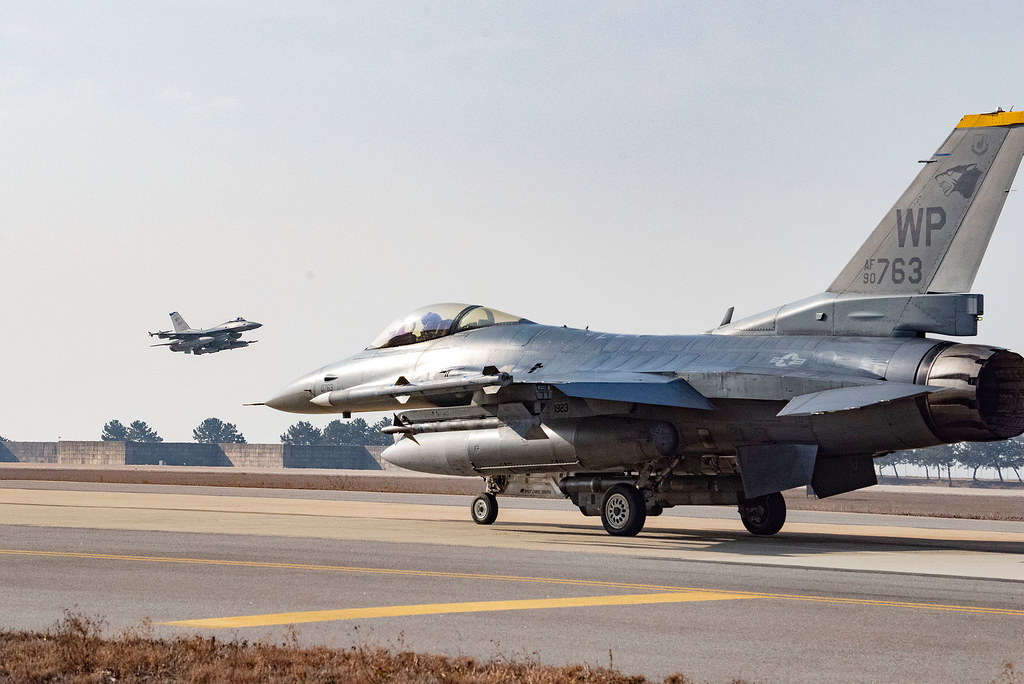
US Deploys F-16 Fighter Jets to Eastern Romania in Response to Airspace Violations
In response to repeated airspace violations by Russian drones and cruise missiles, the Pentagon has taken measures to reinforce NATO’s airspace security in eastern Romania. This involves the deployment of four US Air Force F-16 fighter jets to Fetesti Air Base, aimed at strengthening NATO’s air policing efforts in the Black Sea region.
On September 22nd, these four F-16 fighter jets arrived at Fetesti Air Base, signaling the United States’ commitment to enhancing regional security. These F-16C Block 50 fighters, as seen in images published by NATO, have been configured for extended air superiority operations. Each aircraft is equipped with auxiliary fuel tanks, twin AAMRAM/AIM-120 long-range missiles, and four AIM-9 medium-range missiles.
Identified by tail lettering, these jets belong to the U.S. Air Force’s 480th Fighter Squadron, a unit within the 52nd Tactical Fighter Wing based in Spangdahelm, Germany. This squadron has been actively deploying sub-units to Poland as part of NATO’s ongoing air policing operations in the Baltic region.
Operating from the Romanian Air Force’s 86th Air Base near the town of Fetesti in southeastern Romania, American air and ground crews have been newly stationed in the area.
The NATO statement announcing this deployment did not explicitly mention Russia, nor did it outline rules of engagement for US airmen in the event of encounters with guided weapons launched by the Russian military during patrols.
This deployment of American combat jets to the Black Sea coastal region follows a September 17th announcement by Bucharest, declaring airspace closure along Romania’s eastern border with NATO enforcing a no-fly zone. This announcement was prompted by numerous Russian missile and drone attacks on Ukrainian civilian port facilities along the Danube River, which forms the border separating Ukraine from NATO territory. Remarkably, some of these Russian kamikaze drones missed their targets during September raids and detonated in Romania, creating embarrassment for Romania’s National Liberal Party-led government.
F-16s based in eastern Romania, including Fetesti, are regularly reinforced by combat elements from other NATO member states to conduct air policing missions over the Black Sea. Countries such as the Netherlands, Italy, Spain, and Great Britain have contributed contingents to these operations in the past.
While the US Air Force has been the primary operator of military reconnaissance aircraft in the western and central Black Sea region since Russia’s invasion, deploying combat aircraft to eastern Romania has been relatively infrequent. In 2022, US Air Force F-16s from Germany and Italy operated from Fetesti base, but both contingents had departed by year’s end.
Recent events involving Russian drone and missile strikes near the Romanian border underscore the potential for confrontations between NATO and Russian military forces operating in the region.
Furthermore, NATO’s observation and reconnaissance aircraft in the Black Sea, near Russia-occupied Crimea, have been a persistent point of contention. The Kremlin suspects these aircraft of gathering targeting data for Ukrainian military intelligence, leading to frequent harassment by Russian combat jets.
In March, a Russian Su-27 accidentally collided with a US Air Force MQ-9 Reaper drone in international airspace, while in September of the previous year, a Russian Su-27 fired two missiles at an unarmed Royal Air Force RC-135 flying over the Black Sea. Both incidents, despite their gravity, were somewhat downplayed in official responses.
The last major NATO air defense training event in the Black Sea region occurred in late July, with participation from air forces of Romania, France, Germany, and the US Navy.
Reportedly, Fetesti Air Base will serve as the chosen location for NATO states to train Ukrainian pilots on US-made F-16 fighter jets. Training, as per official announcements, was expected to commence in August. Ukrainian pilots undergoing training in Romania will not participate in NATO actions against Russian airspace violations from within Ukraine, according to Ukrainian officials.